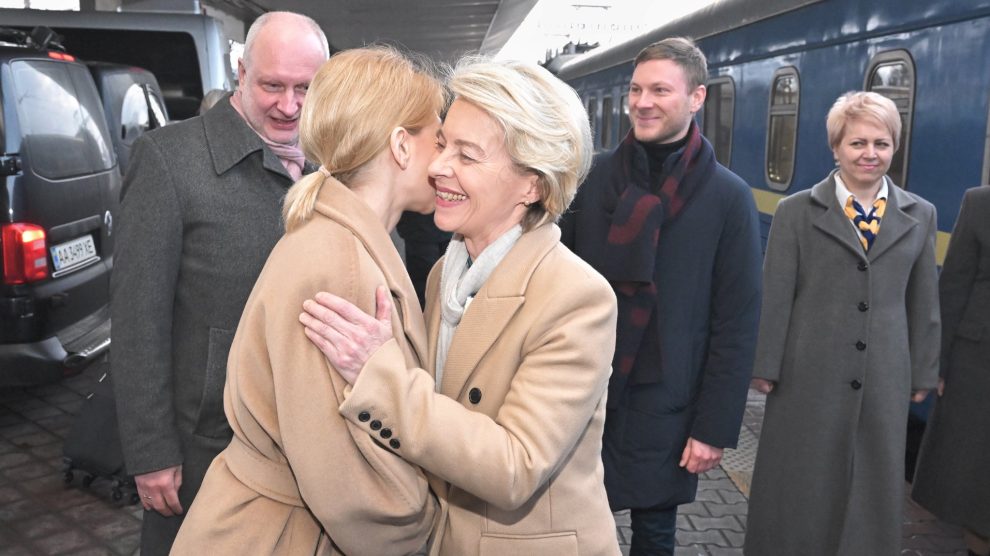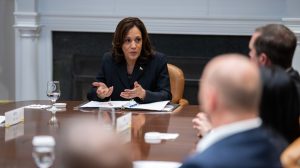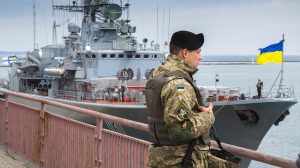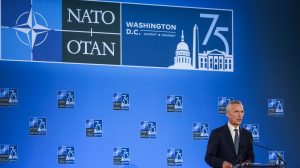You can read all of our coverage of Russia’s invasion of Ukraine, including explainers and articles offering context and background information here.
Russia’s invasion of Ukraine
The European Union’s top officials arrived in Ukraine on Thursday ahead of a summit with President Volodymyr Zelensky to discuss issues including Ukraine’s reconstruction and its candidacy for membership in the bloc.
“We are here together to show that the EU stands by Ukraine as firmly as ever,” Ursula von der Leyen, the president of the European Commission, said on Twitter, adding that it was “good to be back in Kyiv” for her fourth visit to the Ukrainian capital since Russia launched its full-scale invasion almost a year ago.
Ukraine was made an EU candidate last June, in what Zelensky said was a unique and historic moment. While candidate status is a first step to membership, the accession process typically takes many years and some countries – mainly in the Western Balkans – are currently languishing in the queue. Ukraine is unlikely to receive any special treatment.
A draft EU statement, to be released after the summit, will, however, reiterate a pledge that Ukraine’s future lies within the EU, acknowledging the “considerable efforts” made in recent months towards meeting objectives underpinning its candidate status and carrying out reforms.
In a recent article for Emerging Europe, Olha Stefanishyna, Ukraine’s deputy prime minister, argued that during wartime, Ukraine’s EU integration is more important than ever
Those reforms include tackling corruption, and Ukraine this week launched a fresh wave of anti-corruption raids on high-profile figures, including one of the country’s richest men, Ihor Kolomoisky.
The home of former interior minister Arsen Avakov was also searched, as part of the apparent purge.
Ukraine has launched an anti-corruption drive and officials said the leaders of the customs service had been fired. Zelensky said the raids were necessary to ensure “people do not abuse power”.
Russia is planning a major offensive to coincide with the one-year anniversary of the war in Ukraine on 24 February, according to Ukraine’s defence minister, Oleksii Reznikov.
Speaking to French media, Reznikov warned that Russia would call on a large contingent of mobilised troops. Referring to Russia’s general mobilisation of 300,000 conscripted soldiers in September last year, he claimed that numbers at the border suggest the true size could be closer to 500,000.
“We do not underestimate our enemy,” Reznikov said. “Officially, they announced 300,000, but when we see the troops at the borders, according to our assessments it is much more.”
Georgia’s president this week said Russia must be required to abandon its nearly 15-year-long occupation of her nation’s territory as part of an eventual peace deal to end the Kremlin’s war in Ukraine.
“Russia has to learn where its borders are,” President Salome Zourabichvili said in an interview in the capital, Tbilisi.
“The Georgian issues should be on the table because nobody should think that this war can be resolved without Russia retreating from all the occupied territories” in the region, she said.

Other news
Retired NATO general Petr Pavel was last weekend elected as the new president of Czechia, seeing off his populist challenger Andrej Babiš. The 61-year-old took 58.32 per cent of the vote. Speaking after the announcement of the results, Pavel said values such as truth, dignity, respect and humility had won. “The vast majority of Czechs share these values, and it’s time to return them to the castle and to politics,” he added.
Bulgaria’s president dissolved the National Assembly on Thursday and called early parliamentary elections for April 2 in hopes of resolving the country’s a bid to settle the country’s prolonged political impasse and biting economic woes. President Rumen Radev also appointed a caretaker government ahead of the snap vote, which will be Bulgaria’s fifth in two years. Radev reappointed Galab Donev, a 55-year-old independent politician, to remain at the helm of the interim cabinet until the next parliament elects the members of a regular government.
Also this week, Radev and his Serbian counterpart, Aleksandar Vučić, launched the construction of a gas pipeline that will link the two countries and help ease the region’s dependence on Russian supplies, which have become less reliable amid Moscow’s war against Ukraine. Attending a groundbreaking ceremony in the Bulgarian town of Kostinbrod on Wednesday, the two leaders shook hands where one end of the 170-kilometre link – 109 kilometers of which will run through Serbia – will be built. “This is a big thing, a European project. We will supply other countries via our country,” Vučić said.
Azerbaijani government-affiliated media and analysts are directly blaming Iran’s government for organising the deadly attack on the Azerbaijani embassy in Tehran, even as official Baku is stopping short of such overt accusations. The January 27 attack, which killed one Azerbaijani security guard, is the most serious escalation yet in the tense relations between the two neighboring countries, which have been deteriorating since the 2020 war between Azerbaijan and Armenia.
Hungary is perceived as having the worst public sector corruption record in the EU, according to Transparency International’s latest report. With scores ranging from 42 to 46 out of 100, Hungary, Bulgaria and Romania are far behind the EU’s Scandinavian top three, with Denmark crowned as best in class (90), followed by Finland (87) and Sweden (83), in the anti-corruption NGO’s 2022 Corruption Perceptions index.
The number of births in Poland last year was the lowest the country has seen since World War II, while the number of deaths was higher than at any time other than in the pandemic-hit years of 2020 and 2021. It was also the tenth year in a row in which deaths have outnumbered births. Figures published on Wednesday by state statistical agency GUS revealed that there were 305,000 births in 2022, down from 331,000 the previous year and 386,300 a decade earlier, in 2012.
Mikheil Saakashvili, the jailed former president of Georgia, appeared in court via video link on Wednesday to show how much weight he had lost while incarcerated, as associates renewed calls for him to be freed for urgent medical treatment. Saakashvili, 55, was sent to prison in 2021 for six years on charges of abusing his power while president, a charge he says was politically motivated. His health has deteriorated in prison, where he has staged repeated hunger strikes and alleges he was poisoned.
The European Commission this week approved a Romanian plan to set-up a Romanian Investment and Development Bank aimed at supporting economic and social development, competitiveness, innovation and growth across Romania’s economy. The bank – which will have initial capital of 1.6 billion euros – will be established as a fully state-owned entity, with the Romanian Ministry of Finance as its shareholder, and will act under the supervision of the National Bank of Romania.
Photo: Ursula von der Leyen official Twitter account.
Unlike many news and information platforms, Emerging Europe is free to read, and always will be. There is no paywall here. We are independent, not affiliated with nor representing any political party or business organisation. We want the very best for emerging Europe, nothing more, nothing less. Your support will help us continue to spread the word about this amazing region.
You can contribute here. Thank you.







Add Comment